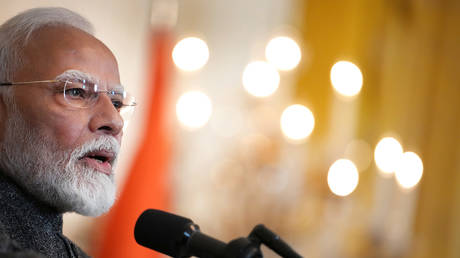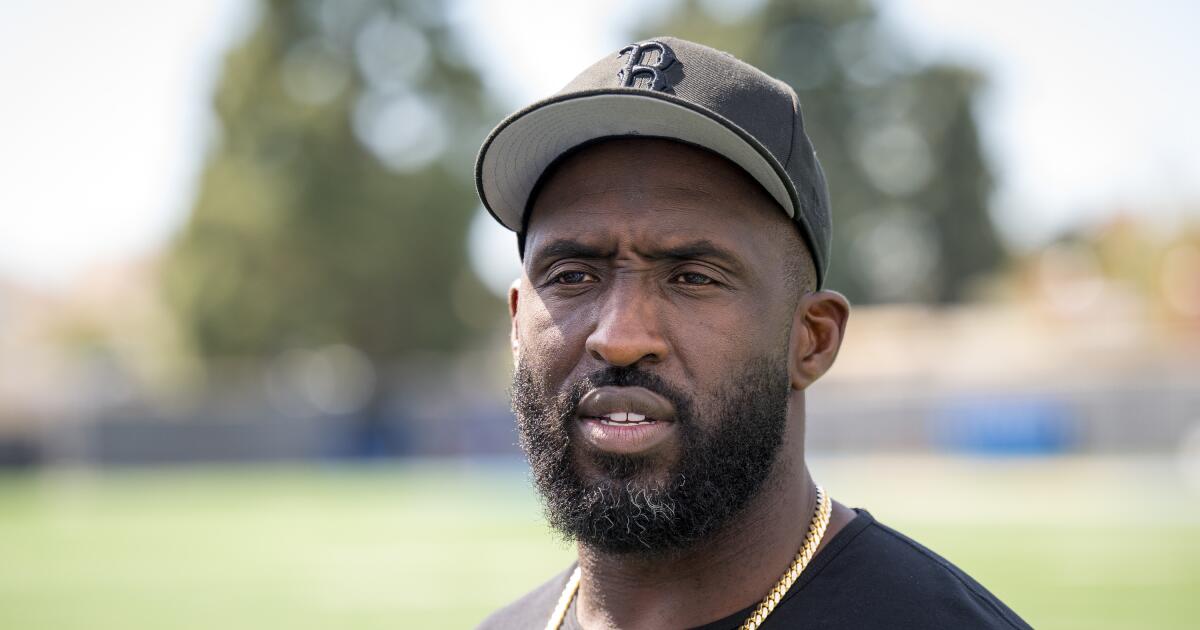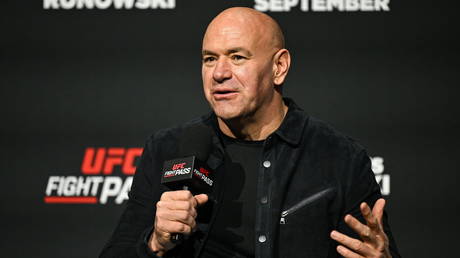Abrego Garcia inflames Trump tensions with some conservatives, libertarians
President Trump’s handling of the deportation of Kilmar Abrego Garcia, an immigrant who was mistakenly sent to a prison in El Salvador, is inflaming tensions with libertarians and some rule-of-law conservatives. Trump has further alarmed some conservative allies by declaring last week that his administration is exploring the possibility of deporting incarcerated U.S. citizens to...

President Trump’s handling of the deportation of Kilmar Abrego Garcia, an immigrant who was mistakenly sent to a prison in El Salvador, is inflaming tensions with libertarians and some rule-of-law conservatives.
Trump has further alarmed some conservative allies by declaring last week that his administration is exploring the possibility of deporting incarcerated U.S. citizens to serve out their sentences in foreign prisons, such as El Salvador’s sprawling Terrorism Confinement Center.
Senior White House officials view the political battle over Abrego Garcia as a winning political message, and polls show Trump is doing well on the issue of immigration, but the president’s handling of Abrego Garcia has also driven a wedge between his administration and libertarians and rule-of-law conservatives, who traditionally make up a key part of the GOP.
Some of them are uncomfortable with the White House’s reluctance to comply with a court order to “facilitate” Abrego Garcia’s return.
“Under the theory that the administration is touting, they could take you or me, throw us to El Salvador and say, ‘Sorry, nothing we can do about it. We agree it was an administrative error. Tough,’” said Bruce Fein, a Justice Department official during the Reagan administration who describes himself as a “rule-of-law conservative.”
The Justice Department lawyer who initially argued the case for the administration, Erez Reuveni, conceded that Abrego Garcia should not have been sent to El Salvador and said the government only had “jurisdictional” arguments against returning him. That lawyer was later fired, according to media reports.
Fein said the Constitution does not draw a distinction between U.S. citizens and persons who are not citizens living in the United States when it comes to granting due process under the law.
“Conservatives believe in due process,” said Fein, who added that he would not have any problem with Abrego Garcia’s deportation if the Trump administration had obtained a deportation order.
But he noted that the administration ignored the October 2019 ruling by an immigration judge who ordered a withholding of removal for Abrego Garcia because he had a “well-grounded fear” of future persecution.
“The Trump administration didn’t appeal that,” he said. “There’s a process by which you decide whether they’re here illegally or not. Just like I believe if you’re accused of first-degree murder, we don’t send you out and shoot you in the head before a trial.”
Fein noted that the Constitution draws a distinction between U.S. citizens and persons living in the United States on some rights but makes no such distinction when it comes to guaranteeing due process.
“Suppose that wasn’t true and you’re not a citizen and not a person protected by the law, anybody could walk up and shoot you in the head and that would be legal. We’re not that brutal,” he said.
There are already tensions between Trump and libertarian conservatives such as Sen. Rand Paul (R-Ky.) over the administration’s aggressive use of tariffs to lower U.S. trade deficits with other countries.
Some Republicans in Congress are pushing back on the criticism that Abrego Garcia failed to receive just treatment under the law.
House Majority Whip Tom Emmer (R-Minn.) told CNN’s “State of the Union” on Sunday that the migrant’s request for asylum was heard and rejected by the Trump administration.
“It’s very interesting when people talk about the fact that this illegal alien, who is not a resident of the U.S., he is a citizen of El Salvador, actually did have due process in an asylum hearing, where his request for asylum was rejected by the Trump administration as part of the promise that they made during the campaign,” Emmer asserted.
Other Republicans have been put on the defensive by the administration’s handling of the controversial case.
A town hall meeting with Sen. Chuck Grassley (R-Iowa) grew heated last week when members of the audience pressed the 91-year-old senator about the matter.
One man got applause from the crowd after demanding of Grassley, “Are you going to bring that guy back from El Salvador?”
When Grassley said he wouldn’t, the man demanded: “Why not?”
Grassley received a raucous response from the audience when he argued that El Salvador is an independent country and its president is not subject to the jurisdiction of the U.S. Supreme Court.
Thomas Berry, the director of the Robert A. Levy Center for Constitutional Studies at the Cato Institute, a think tank dedicated to moving public policy in the direction of individual liberty, limited government and free markets, said he has serious concerns about the Trump administration’s handling of the Abrego Garcia case.
Berry, who describes himself as a libertarian, said he’s “extremely concerned.”
“I think the government has shown somewhat shocking lack of care in the case, lack of attention to due process. Without explicitly disregarding the Supreme Court’s order, they’re pushing to the absolute outer limits what can plausibly be a good-faith view of the Supreme Court’s order,” he said.
“In other words, I think they are coming close to bad-faith readings of the Supreme Court’s efforts to delay and stonewall as long as possible up to the point where the Supreme Court gives them an even more explicit direction to take certain actions,” he added.
The Supreme Court on Saturday temporarily blocked the deportation of Venezuelans held in Texas under the Alien Enemies Act of 1798 in response to an emergency appeal form the American Civil Liberties Union.
The Supreme Court had ruled earlier this month that the Trump administration must “facilitate and effectuate” the return of Abrego Garcia, sending the case back down to a lower court.
The Maryland man’s lawyers wrote in a filing to federal Judge Paula Xinis on Tuesday said the administration has defied a court order to more fully explain its actions in sending Abrego Garcia to El Salvador.
The Trump administration said in court documents filed Tuesday that it was having “appropriate diplomatic discussions” with El Salvador about Abrego Garcia, but the State Department hasn’t yet commented in detail about those talks.
Beyond that high-profile case, conservatives have bigger concerns about Trump’s comment at a meeting with Salvadoran President Nayib Bukele that his administration is reviewing the idea of sending U.S. citizens convicted of crimes to foreign prisons.
“The homegrowns are next, the homegrowns. You’ve got to build about five more places,” Trump said to Bukele.
That is setting off alarms among some Republicans.
“The bigger concern of libertarians is what Trump said about deporting homegrown criminals, so American citizens, to El Salvador. I think that raises big red flags with libertarians,” said Brian Darling, a Republican strategist and former Senate aide.
While Trump often likes to make provocative statements, his expressed interest in deporting U.S. citizens can’t be dismissed
Darling said you’re seeing “a lot of heartburn” among libertarians and constitutional conservatives over the administration’s stance in the Abrego Garcia case but added its most worrisome as a potential precedent.
“For the most part, most are more worried about what comes after this. This case is complicated [because] even it was resolved the way the courts want, where you bring the guy back, he’s going to get deported [later] anyway,” Darling said.
“The big picture is citizens should not be deported without due process to El Salvador. That raises huge red flags,” he added. “I don’t know if it’s serious or not but when you have the commander in chief saying that, the president saying these things, you have to take it somewhat seriously,” he added.
Sen. John Kennedy (R-La.), a member of the Senate Judiciary Committee, on Sunday expressed his concern with Trump’s statement about sending U.S. citizens to foreign prisons.
“We have our own laws. We have the Eighth Amendment to the Constitution. We shouldn’t send prisoners to foreign countries, in my judgment,” he told NBC’s “Meet the Press.”










































































